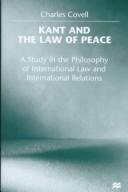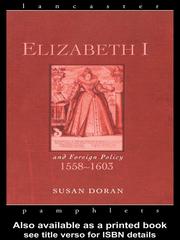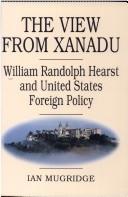| Listing 1 - 10 of 13 | << page >> |
Sort by
|

ISBN: 0333602110 Year: 1997 Publisher: Basingstoke London Macmillan
Abstract | Keywords | Export | Availability | Bookmark
 Loading...
Loading...Choose an application
- Reference Manager
- EndNote
- RefWorks (Direct export to RefWorks)
International law --- Philosophy --- Peace --- Kant, Immanuel --- Views on international relations

ISBN: 1134741200 1280326786 0203136632 9780203136638 9780415153553 0415153557 9781280326783 9786610326785 6610326789 0415153557 9781134741205 9781134741151 1134741154 9781134741199 1134741197 9781138146655 113814665X Year: 2000 Publisher: London New York Routledge
Abstract | Keywords | Export | Availability | Bookmark
 Loading...
Loading...Choose an application
- Reference Manager
- EndNote
- RefWorks (Direct export to RefWorks)
At her accession in 1558 Elizabeth I inherited a troublesome legacy with a long history of wars against France and Scotland. This international situation was becoming a huge financial burden on the English crown and economy.Elizabeth I and Foreign Policy describes and assesses England's foreign policy during the second half of the sixteenth century. It includes coverage of Elizabeth's relations with foreign powers, the effect of Reformation on foreign affairs, Elizabeth's successs as a stateswoman and the war with Spain.
Elizabeth --- Elisabeth --- Views on international relations. --- Great Britain --- Foreign relations
Book
ISBN: 0333612140 Year: 1994 Publisher: Houndmills, Basingstoke, Hampshire New York Macmillan St. Martin's Press, in association with St. Antony's College, Oxford
Abstract | Keywords | Export | Availability | Bookmark
 Loading...
Loading...Choose an application
- Reference Manager
- EndNote
- RefWorks (Direct export to RefWorks)
Digital
Abstract | Keywords | Export | Availability | Bookmark
 Loading...
Loading...Choose an application
- Reference Manager
- EndNote
- RefWorks (Direct export to RefWorks)

ISBN: 1282857339 9786612857331 0773565256 9780773565258 0773512810 9780773512818 0773512950 9780773512955 9781282857339 6612857331 Year: 1995 Publisher: Montreal [Que.] McGill-Queen's University Press
Abstract | Keywords | Export | Availability | Bookmark
 Loading...
Loading...Choose an application
- Reference Manager
- EndNote
- RefWorks (Direct export to RefWorks)
Hearst is usually remembered as a flag-waving, jingoistic patriot who was anti-British, anti-French, anti-Oriental - anti almost everything except the United States. He was regarded as an admirer of Hitler and Mussolini, and a staunch isolationist who believed that minimizing American contact with the rest of the world was the only sure way to achieve security. Using all the journalistic apparatus at his disposal, Hearst trumpeted his views about the conduct of other nations and peoples and, more particularly, about the conduct of his own country in relation to them. The Spanish-American War of 1898 was often described as "Mr Hearst's war" because of the role he apparently played in pushing the United States into it. Mugridge investigates Hearst's journalistic tactics, which seldom varied, and concludes that ultimately Hearst's flamboyant style militated against his being taken seriously by those responsible for the nation's affairs. Exploring the personal side of this very public figure, Mugridge argues that Hearst was a far more complex individual than previous biographers have assumed. He probes beneath Hearst's largely self-created image to delineate the aspirations, anxieties, and vanities that led Hearst to embrace and advance his positions on U.S. foreign relations.
Press and politics --- Politics and the press --- Press --- Advertising, Political --- Government and the press --- Journalism --- History --- Political aspects --- Hearst, William Randolph, --- Views on international relations. --- Influence. --- United States --- Foreign relations --- Publishers and publishing --- Hearst, William Randolph --- Views on international relations --- Influence --- 20th century --- New York (N.Y.)
Multi
ISBN: 9782874950988 Year: 2008 Publisher: Waterloo André Versaille
Abstract | Keywords | Export | Availability | Bookmark
 Loading...
Loading...Choose an application
- Reference Manager
- EndNote
- RefWorks (Direct export to RefWorks)
Joxe, Louis --- Diplomatic and consular service [French ] --- History --- 20th century --- Diplomats --- France --- Biography --- Views on international relations --- Views on Algeria --- Joxe, Louis (1901-1991) --- Diplomates --- Biographies --- Et les relations internationales --- Et l'Algérie
Book
ISSN: 10177566 ISBN: 9789291981281 9291981281 Year: 2008 Volume: 111. Publisher: Paris Institute for Security Studies
Abstract | Keywords | Export | Availability | Bookmark
 Loading...
Loading...Choose an application
- Reference Manager
- EndNote
- RefWorks (Direct export to RefWorks)
During the eight years of George W. Bush’s presidency America’s grand strategy changed. The terrorist attacks of 9/11 profoundly altered America’s view of the world. But the manner of Bush’s response to the attacks is the subject of controversy and his major foreign policy decisions, especially the invasion of Iraq, are now considered to have been misjudged by the majority of Americans. Whether Bush will be ultimately judged a failure or not, it is likely that some of the main policies associated with his name will be pursued by his successor – be he Democrat or Republican. The European Union is the closest ally of the United States. The Europeans and the Americans are linked to each other by historical, economic and political ties like no other powers in the world. America’s foreign policy reflects on the Europeans too, in the sense that Europeans are often associated with America’s foreign policy in the eyes of the wider world. Indeed, the outside world often makes no distinction between the US and the EU, simply branding the two as ‘the West’. However, the vast majority of Europeans disapproved of Bush’s foreign policy, especially his decision to invade Iraq, and transatlantic relations consequently suffered during his presidency. The end of the Bush era creates an opportunity for a new departure and a renewed dialogue between the EU and the US. But European expectations of the change that the new president will bring about are often unrealistic. This paper gives an account of Bush’s legacy and its impact on the next US administration’s conduct of foreign policy. It examines the ideology and policies that have characterised Bush’s administration and maps out the likely future orientation of America’s foreign policy. The paper focuses on US relations with Iraq, Iran and China, as well as touching on Europe and Russia.
Iraq War, 2003-2011 --- Guerre en Irak, 2003-2011 --- Bush, George W. --- Views on international relations. --- United States --- European Union countries --- Iran --- China --- Etats-Unis --- Pays de l'Union européenne --- Chine --- Foreign relations --- Relations --- Relations extérieures --- Bush, George Walker, --- Views on international relations --- #SBIB:327.5H10 --- #SBIB:327H15 --- Strategie: algemeen --- Buitenlandse politiek: Noord-Amerika --- Pays de l'Union européenne --- Relations extérieures --- Bush, George Walker, - 1946- - Views on international relations --- United States - Foreign relations - 2001 --- -European Union countries - Foreign relations - United States --- United States - Foreign relations - European Union countries --- European Union countries - Relations - China --- United States - Foreign relations - Iran --- Iran - Foreign relations - United States --- United States - Foreign relations - China --- China - Foreign relations - United States --- Bush, George Walker, - 1946 --- -United States
Book
ISBN: 9782343100838 2343100837 Year: 2016 Publisher: Paris: L'Harmattan,
Abstract | Keywords | Export | Availability | Bookmark
 Loading...
Loading...Choose an application
- Reference Manager
- EndNote
- RefWorks (Direct export to RefWorks)
"U.S. relations with the six nations in the Gulf Cooperation Council - Bahrain, Kuwait, Oman, Qatar, Saudi Arabia and the United Arab Emirates - have been characterized by the use of "smart power" during the administration of President Barack Obama. The evolution in how the United States carries out diplomacy in the region offers an opportunity to examine its value in strengthening relations with the countries involved. This book explores the concept of smart power as a modern outgrowth of more traditional forms of diplomacy. It then examines how the United States has applied it in its diplomatic dealings with each of the GCC countries individually, and assesses the benefits and drawbacks of its use in a critical part of the world."--Page 4 of cover.
Obama, Barack --- Views on international relations --- Political and social views --- Gulf Cooperation Council --- United States --- Arabian Peninsula --- Foreign relations --- Et les relations internationales --- Conseil de coopération des Etats arabes du golfe --- États-Unis --- Relations extérieures --- Power (Social sciences) --- Pouvoir (Sciences sociales) --- History --- Histoire --- Gulf Cooperation Council. --- Persian Gulf Region --- Etats-Unis --- Persique, Région du Golfe --- Persique, Région du Golfe --- Relations extérieures --- Obama, Barack - Views on international relations --- Obama, Barack - Political and social views --- United States - Foreign relations - 2001 --- -United States - Foreign relations - Arabian Peninsula --- Arabian Peninsula - Foreign relations - United States
Book
ISBN: 9782800415482 2800415487 280041698X 9782800416984 Year: 2013 Volume: *114 Publisher: Bruxelles, Belqique : Éditions de l'Université de Bruxelles,
Abstract | Keywords | Export | Availability | Bookmark
 Loading...
Loading...Choose an application
- Reference Manager
- EndNote
- RefWorks (Direct export to RefWorks)
Un exemplaire est un hommage de Marianne Dony
International relations --- European federation --- Political science --- Relations internationales --- Construction européenne --- Science politique --- Philosophy --- History --- Philosophie --- Recherche --- Union européenne --- Et les relations internationales --- Construction européenne --- Views on international relations --- Research --- Philosophie. --- Recherche. --- Et les relations internationales. --- International relations - Philosophy --- International relations - Philosophy - History --- Political science - Europe - History --- International relations.

ISBN: 9780521834858 9781107326033 9780521708746 9781107089600 1107089603 1107326036 9781107095953 1107095956 0521834856 1107086027 9781107086029 1316086143 9781316086148 0521708745 1107101557 9781107101555 1107092825 9781107092822 1299706231 Year: 2004 Publisher: Cambridge, UK New York Cambridge University Press
Abstract | Keywords | Export | Availability | Bookmark
 Loading...
Loading...Choose an application
- Reference Manager
- EndNote
- RefWorks (Direct export to RefWorks)
Alexander Hamilton rose from his humble beginnings as an illegitimate West Indian orphan and emigrant to become the premier statebuilder and strategic thinker of the American Founding generation. This is the first detailed narrative study of his foreign policy role and ideas to appear in more than thirty years. It focuses on Hamilton's controversial activities as a key member of President George Washington's cabinet and as an aspiring military leader in the 1790s, a decade of profound division over the shape and powers of the Federal government, and US policy toward the warring powers of Europe. Drawing parallels between Hamilton and the Florentine diplomatist and thinker, Niccolò Machiavelli, prize-winning historian John Lamberton Harper offers an insightful and accessible account of the origins of Hamilton's outlook, his bitterly personal rivalries with Thomas Jefferson and John Adams, and his indispensable part in designing and implementing US foreign policy.
Hamilton, Alexander --- Views on international relations --- Statesmen --- United States --- Biography --- Foreign relations --- Revolution, 1775-1783 --- 1783-1815 --- Philosophy --- Machiavelli, Niccolo --- Hamilton, Alexander, --- Machiavelli, Niccolò, --- Camillus, --- No Jacobin, --- Pacificus, --- Philo Camillus, --- Phocion, --- Han-mi-erh-teng, Ya-li-shan-ta, --- Gamilʹton, Aleksandr, --- Hamilton, Aleksander, --- Hamilton, A. --- Khamiltŭn, Aleksandŭr, --- Crassus, Lucius, --- Americanus, --- Philosophy. --- History --- Diplomacy --- Diplomatic history --- マキアヴェルリ --- Arts and Humanities --- Machiavelli, Niccolo,
| Listing 1 - 10 of 13 | << page >> |
Sort by
|

 Search
Search Feedback
Feedback About UniCat
About UniCat  Help
Help News
News